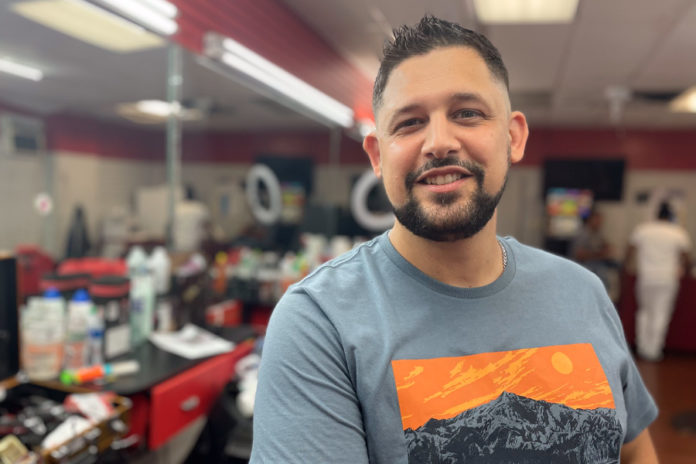
When I made the decision to come to this area, it was hard. Initially, I didn’t know anyone, I didn’t have any roots here. There were a lot of differences compared to my life in Venezuela. Here in North Philadelphia, there are a lot of Dominicans, and a lot of Puerto Ricans. You know, though the people from the Caribbean, Central America and South America are part of the “Latino” culture, and we have many things in common, we also have distinct, sometimes subtly different, cultures. Initially, this was a huge challenge for me. Even until now, I am the only Venezuelan barber in this area. I had to open a space for myself within the existing community, particularly the Dominican community, not because they weren’t welcoming, but more because there was a jarring “choque de cultura” – culture shock. The way people talked, the way they handled themselves, a turn of phrase, a gesture, everything was different. I had never encountered this, and I struggled. It was like starting from the beginning.
At first, I did not understand anything. There were already many barbers, I already had to compete, and the economic pressure was tough. I did not have the support of my people. I was practically alone, and it was very hard not having someone to talk to, in the way you are familiar with. The first couple of years of being an immigrant is truly difficult. I was unknown, my culture was unknown. But I was slowly able to gain people’s trust and they opened the door. It was then I was able to experience the Dominican culture. It is a group that is united in the aspect that they are people who help others. You know usually in a barbershop; your workstation is charged for weekly rent. At the first barbershop I worked, it was owned by a Dominican. For 6, 7 months he did not charge me. He supported me to push, to succeed. In the barbershop, each barber respected each other’s space. If we were several barbers, no one touched anyone’s client even when it was difficult—like an honor code amongst barbers.

So, things began to change, they were making introductions and opening the door for me. I think that the most difficult part was putting myself out there. I think a lot of times we want people to come to us. But it was my turn to go to them and over time I became immersed in this community, so much so that sometimes I had problems with my family, who would joke with me and say, “you sound like a Dominican now.” Due to the political problems that have happened in recent years in my country, you see more of the Venezuelan population emigrating to the United States. I think it’s the last Latin American group that has emigrated to the United States. Things may shift as time goes on, but for me, I will always have a lot to be thankful for to that Dominican community.
Read more of Yamel’s story next week!






